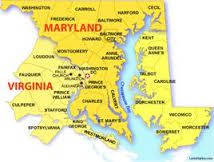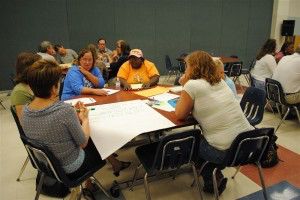Affirmatively Furthering Fair Housing in the Washington, D.C. Region
By Lisa A. Sturtevant, PhD
This summer, the Department of Housing and Urban Development (HUD) published the final Affirmatively Furthering Fair Housing (AFFH) rule that lays out a new process (replacing the analysis of impediments) and provides a new assessment tool so that localities and states can better identify potential fair housing issues and develop solutions. Under the new rule, cities, counties and other entities that receive HUD funding will be required to use local data—including both data provided by HUD and locally-generated data—to assess areas of concentrated poverty, identify disparities in access to opportunity and evaluate unmet housing needs among certain defined subpopulations, including racial and ethnic minorities and persons with disabilities. As a result of this analysis, jurisdictions are required to identify the local (and potentially regional) factors that have contributed to the patterns of housing disparities and develop approaches for breaking down these disparities.
Local jurisdictions that receive more than $500,000 in CDBG funding are among the first that will be required to follow the new AFFH rules. These jurisdictions must submit a new five-year consolidated plan under the new rule on or after January 1, 2017. Many local jurisdictions in the Washington D.C. region will be among the first wave.
The release of the final AFFH rule comes on the heels of the Supreme Court decision earlier this year affirming a lower courts’ decision that local data on race and income can be used to show that housing and land use policies have had discriminatory effects – even if the policies were not intentionally discriminatory. The so-called “disparate impact” decision brings increased attention to local zoning regulations that may have led to segregation by race and income. Thus, the new AFFH rule will likely have implications for local land use and zoning decisions. While HUD continues to believe that land use and zoning regulations are local issues, the new AFFH rule emphasizes that local land use and zoning practices that violate fair housing or other civil rights laws are a Federal concern. The new rule may also affect the ways in which tax credits are allocated. While the distribution of low-income housing tax credits (LIHTC) are generally managed through a state qualified action plan (QAP) process, the AFFH rule brings increased Federal attention to the ways in which the QAP process promotes fair housing.
The AFFH rulemaking process has been on-going for several years. Many organizations—including the National Housing Conference and Enterprise Community Partners—have submitted comments about the rule and the associated fair housing assessment tool. As a result of numerous comments, HUD made several changes to the rule issued this summer.
Despite the improvements, there are still significant concerns about the implementation of the AFFH rule. Of particular concern is the amount of time, resources and expertise that will be required by local officials to complete the process. HUD has estimated that it will take a local jurisdiction 240 hours to complete its assessment of fair housing, but that is likely an underestimate of the time needed to develop meaningful strategies for meeting fair housing goals.
In addition, the new process requires more specialized knowledge and research expertise to prepare the submission. Many jurisdictions in the Washington, D.C. region have highly skilled planning and housing staff; however, smaller jurisdictions and agencies that have faced cuts recently may be especially burdened. Local jurisdictions that are already short staffed will either have to divert time and resources to the new process or will have to hire outside consultants to help with the submission.
 Key to the new fair housing assessment tool are the local data and maps that HUD is making available to all local jurisdictions. The tool includes maps and data tables of race/ethnicity, national origin and limited English proficiency, disability type, age, sex, and families with children. HUD has also stated that local jurisdictions will be encouraged to make use of locally-generated data to supplement or even replace the HUD-provided data. There are concerns about the data piece of the assessment tool. Some of the most relevant data are very limited, including data on the LIHTC program and housing for persons with disabilities. The data are based on estimates from the most recent five-year American Community Survey file, which could provide an outdated look at the demographics of a fast-growing jurisdiction. Furthermore, the final rule has been unclear about the types of local data that will be required. While the data provided by HUD are helpful, there is a lot more information needed to understand how to use the HUD-provided data and what locally-generated data will be required for the new fair housing assessment process.
Key to the new fair housing assessment tool are the local data and maps that HUD is making available to all local jurisdictions. The tool includes maps and data tables of race/ethnicity, national origin and limited English proficiency, disability type, age, sex, and families with children. HUD has also stated that local jurisdictions will be encouraged to make use of locally-generated data to supplement or even replace the HUD-provided data. There are concerns about the data piece of the assessment tool. Some of the most relevant data are very limited, including data on the LIHTC program and housing for persons with disabilities. The data are based on estimates from the most recent five-year American Community Survey file, which could provide an outdated look at the demographics of a fast-growing jurisdiction. Furthermore, the final rule has been unclear about the types of local data that will be required. While the data provided by HUD are helpful, there is a lot more information needed to understand how to use the HUD-provided data and what locally-generated data will be required for the new fair housing assessment process.
Finally, the new rule allows local jurisdictions to prepare a joint or regional fair housing assessment, which could lead to greater cooperation and a better approach to meeting housing needs. However, the new rule offers no specific incentives to take a regional approach to the assessment. If individual jurisdictions in the Washington, D.C. region produce individual fair housing assessments under the new AFFH rule, the region misses out on an important opportunity to strengthen regional cooperation on housing issues.
 More information will be coming out on the AFFH and fair housing assessment tool from HUD, as well as from Enterprise, NHC and other housing organizations. In the near term, however, local jurisdictions in the Washington, D.C. region can start discussing the new rule and sharing information now so that they will be prepared when it comes time to develop the new fair housing assessments:
More information will be coming out on the AFFH and fair housing assessment tool from HUD, as well as from Enterprise, NHC and other housing organizations. In the near term, however, local jurisdictions in the Washington, D.C. region can start discussing the new rule and sharing information now so that they will be prepared when it comes time to develop the new fair housing assessments:
- Discuss fair housing regionally. With coordination from the Metropolitan Washington Council of Governments (MWCOG), local housing officials can begin to look at the HUD-provided data and maps for the region as a whole. By examining the Federally-supplied data, local housing planners can discuss what the data suggest about segregation and concentrated poverty, regionally; examine the demographic data in light of MWCOG’s planning work around activity centers; and provide a platform for how the AFFH rule relates to regional housing planning.
- Share best practices around data. The Washington, D.C. region has some incredible local government staff who know a lot of local demographic and economic data and mapping. The new fair housing assessment will likely require localities to pull together data that the Federal government cannot provide—for example, on the disabled population and accessible units, specifics about tax credit properties, etc. Local research planners and others who work with local data can read through the AFFH rule paying acute attention to the local data section and then come together to discuss ways in which local data are being collected in different jurisdictions.






Trackbacks & Pingbacks
[…] | In their Matters@Hand thought-leadership series sponsored by Enterprise Community Partners, HAND explores the new Affirmatively Furthering Fair Housing rule, requiring cities, counties and other entities receiving HUD funding to use local data to better […]
Leave a Reply
Want to join the discussion?Feel free to contribute!